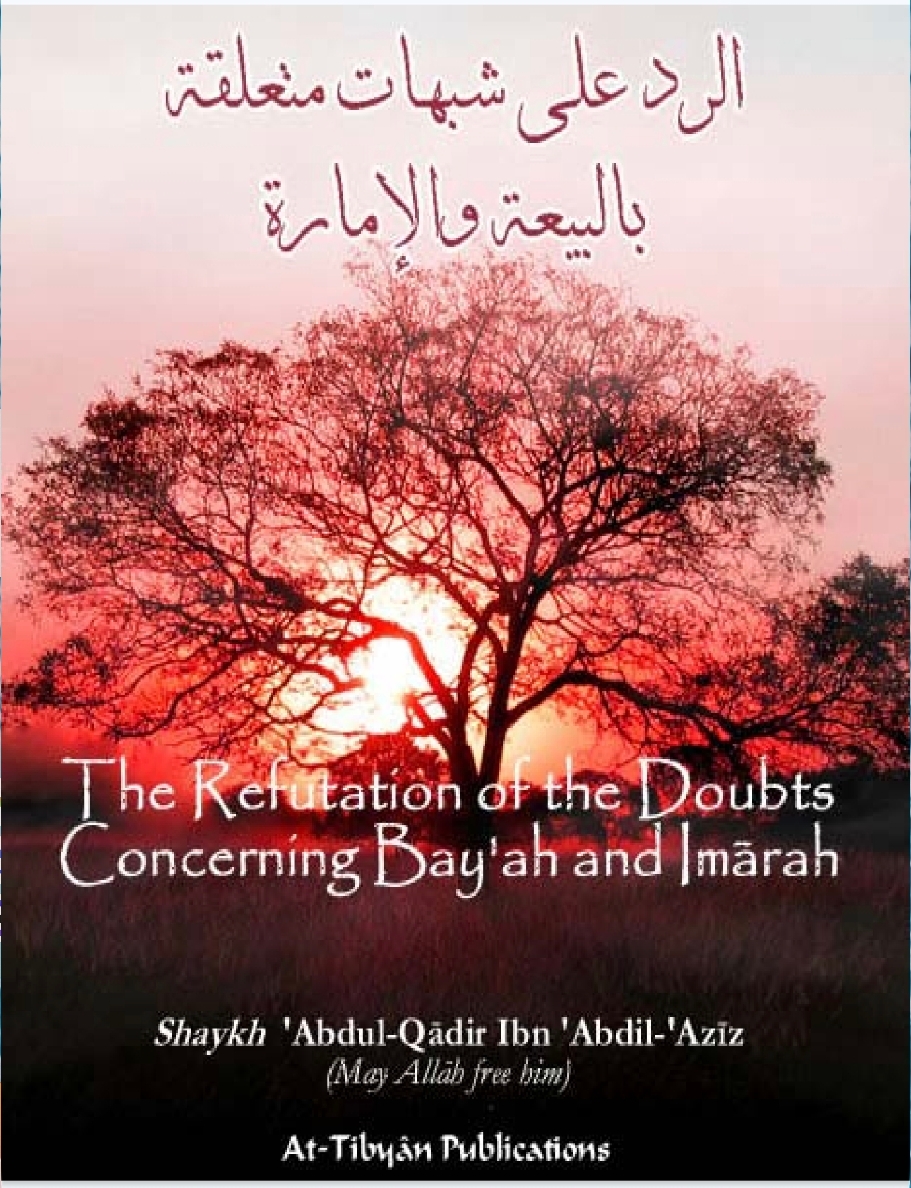Hub For Your Daily Islamic Insights 🕋 🕌

The Refutation of the Doubts Concerning Bay'ah and Imārah, A critical examination of leadership and allegiance in Islam
A critical examination of leadership and allegiance in Islam
Free
Discover the essential guide to understanding Islamic leadership with 'The Refutation of the Doubts Concerning Bay'ah and Imārah' by Shaykh 'Abdul-Qādir Ibn 'Abdil-'Azīz. This authoritative work addresses and dispels widespread misconceptions surrounding Bay’ah (allegiance) and Imārah (leadership), providing readers with clear, well-researched explanations rooted in traditional scholarship. Perfect for students, scholars, and anyone seeking clarity on Islamic governance, this book deepens your religious knowledge and enhances your perspective on core community principles. Printed in a convenient paperback format, approximately 6 x 9 inches, with a sleek, classic cover design that will complement any bookshelf. Elevate your understanding and enrich your library with this must-read title.
### The Refutation of Doubts Concerning Bay'ah and Imārah: A Critical Examination of Leadership and Allegiance in Islam #### Introduction In Islamic discourse, the concepts of bay'ah (pledge of allegiance) and imārah (leadership or governance) hold significant importance. They embody the social contract between a leader and the community, establishing not just authority but mutual responsibilities. Despite their foundational role in Islamic governance, misconceptions and doubts frequently arise regarding their legitimacy and application. This examination aims to clarify these concepts and address the prevalent doubts surrounding them from an Islamic theological and historical perspective. #### Understanding Bay'ah Bay'ah, literally meaning 'to sell,' refers to a formal pledge made by followers to their leader. It goes beyond mere loyalty; rather, it symbolizes a covenant that entails spiritual, social, and political obligations. In the Prophetic traditions, bay'ah was embraced by the companions of the Prophet Muhammad (peace be upon him) as a means to affirm their commitment to his leadership and the principles of Islam. The first bay'ah took place at Aqabah, where the representatives of Khazraj pledged their allegiance to the Prophet, marking a pivotal moment in Islamic history that transitioned into a structured community. Doubts surrounding bay'ah often stem from its perceived coercive implications or the argument that it supports autocratic leadership. Yet, these concerns overlook the Quranic and prophetic precedents in which bay'ah is portrayed as a voluntary act necessitating mutual consent. The Prophet sought the allegiance of the people through dialogue and mutual agreement, underscoring that allegiance is not merely a transaction but a collaborative engagement. #### Refutation of Common Doubts About Bay'ah 1. **Allegiance as Coercion**: Critics argue that bay'ah can lead to coercion. In response, it is essential to highlight that authentic bay'ah, as exemplified by the Prophet, was rooted in free will and mutual trust. The presence of a loyal opposition in various Islamic states historically reinforces that bay'ah is not blind obedience but an agreement to work towards mutual welfare under the leader’s guidance. 2. **Bay'ah and Autocracy**: Another hesitation stems from the belief that institutionalizing bay'ah perpetuates tyranny. However, the concept, particularly in the context of Islamic governance, includes the obligation for leaders to adhere to justice, protect the rights of the community, and be held accountable. Islamic legal frameworks promote the idea that a leader can be dethroned through legitimate means if they fail in their duties. 3. **The Irrelevance of Bay'ah Today**: Some assert that bay'ah is an obsolete tradition in modern governance. This view neglects the underlying principles of democratic engagement that bay'ah promotes. Numerous contemporary Islamic scholars advocate for reformulations of bay'ah that reflect democratic values, ensuring leaders are receptive to the voice of the people while maintaining Islamic principles. #### Imārah: Leadership in Islam Imārah encompasses more than governance; it signifies an ethical and moral responsibility to act justly and uphold the welfare of the community. The Quran asserts the importance of leadership in several verses, calling leaders to fear God and uphold justice (Quran 4:58). The foundational principle here is that leadership is a trust (amanah) that requires sincerity, integrity, and dedication to the community's interests. Doubts regarding imārah often focus on the qualifications and legitimacy of leaders, especially in diverse Muslim societies. This is exacerbated by historical instances where rulers have exploited their positions for personal gain, leading to questions about the nature of authority in Islam. #### Addressing Concerns About Imārah 1. **Qualifications of Leaders**: Detractors often question the criteria by which leaders are chosen, suggesting that any form of hereditary or autocratic rule is contrary to Islamic principles. However, historical caliphates demonstrate a varying array of leadership models that were not solely based on lineage. Instead, qualities such as knowledge, piety, and capacity to govern effectively were emphasized. 2. **The Nature of Authority**: Critics posit that imārah is inherently oppressive. In response, it is crucial to refer to the prophetic tradition, which illustrates that a leader earns authority through trust and service rather than mere force. The principle of Shura (consultation) in Islam exemplifies the expectation for leaders to engage with those they govern, reinforcing accountability. 3. **Contemporary Challenges**: Present-day rulers, particularly in the Muslim world, face challenges in embodying the principles of imārah. However, the resurgence of political Islam highlights a growing commitment among scholars and activists to revert to these principles and advocate for reformative measures that ensure accountability and justice. #### Conclusion The concepts of bay'ah and imārah remain integral to understanding Islamic leadership and societal governance. Addressing doubts and refuting misconceptions about these concepts is critical in fostering a nuanced understanding suitable for contemporary contexts. It is essential for Muslim scholars and communities to engage with their history and texts to extract meaningful lessons that can guide current practices. Emphasizing participatory governance, accountability, and justice will ensure that bay'ah and imārah continue to function effectively in a manner that is relevant to today’s socio-political landscapes. The legacy of the Prophet's leadership and the following generations can inspire Muslims to develop systems that honor their faith, promote good governance, and ensure the social contract is respected and fulfilled, drawing on the timeless values enshrined in Islam.
